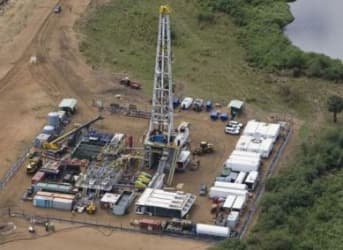
Tensions along the border between Democratic Republic of Congo (DRC) and Uganda have risen over the last decade, as successive exploration and appraisal efforts have revealed presence of massive oil and gas reserves around the Lake Albert region.
Reports from current and former concessionaires suggest that there are over 2.5 billion barrels of oil in place underneath Lake Albert, located in eastern Democratic Republic of Congo (DRC) with a potential for double that amount yet to be confirmed. However, these commercial hydrocarbons discoveries have invited critical border disputes that have not only resulted into conflicts and deaths, but also slowed down progress in exploitation of oil and gas resources.
Lake Albert is located in the eastern area of the DRC more than 1,200 miles away from its capital city: Kinshasa. The boundary around the Lake was originally established in 1915, by former colonialists Belgium and the United Kingdom, which split the lake in half between DRC to the West and Uganda to the East.
Related: Egypt And The Double-Edged Sword Of Cheap Oil
On the Eastern side of the Lake, Total, Tullow and China National Offshore Oil Corporation (CNOOC) own stakes in blocks 1, 2 and 3A in a tripartite agreement with the government of Uganda. Ownership of blocks 1 and 2 on DRC side are still contested since the DRC government has issued several licenses to various companies over the last 10 years.

Source: Tufts University
DRC, the second largest country in Africa, has been producing oil since 1976 mainly from its western coastal areas. Current average oil production is estimated at 23,000 barrels per day (b/d). The country is facing difficulty in governing and controlling its natural resources given the size of the country and complex nature of multi factor humanitarian crisis.
Petroleum development programs on the Ugandan side are underway and the first oil is expected as early as 2018. Cooperation between Kenya, Uganda and Rwanda has resulted in an agreement to develop a 60,000 b/d oil refinery in Hoima, Uganda and an 807 mile pipeline connecting Lake Albert to the port of Lamu in Kenya.
Infrastructure development
Developing petroleum resources in remote and politically risky regions like Lake Albert is a very costly exercise, and the ongoing fall in oil prices may hamper the progress that has already been made. The past three months have seen oil prices fall from $100 to $65 which has already put pressure on the stakeholders overseeing the petroleum development in the region.
On the Ugandan side alone, upstream development would cost $8-10 billion. The development of the refinery, crude oil pipeline and related downstream infrastructures would cost $6-7 billion. If oil prices continue to tumble, investors will be forced to go back to the drawing board to re-assess their options.
Related: Violence In South Sudan Threatens Chinese Oil Investment
Cross-border joint development of Lake Albert reserves could reduce the budget burden for both the two governments and for companies, and it could present room for optimal development of these petroleum reserves. DRC would be better served if it joined forces with East African countries in developing its oil reserves in the eastern part of the country.
Opportunity for cooperation
The presence of hydrocarbons around the border provides opportunity for bilateral negotiations that can promote cooperation and enable optimal exploitation of the natural resources. Although Uganda is ahead in terms developing its oil reserves around the border, there is still ample time for DRC to join forces with both the Ugandan government, CNOOC, Total and Tullow Oil in jointly developing the reserves beneath and around Lake Albert.
ADVERTISEMENT
There still remain many unexplored basins around the DRC-Uganda border. If the disputes remain unresolved, these governments will have a difficult time attracting new investors to help exploit these resources especially when oil prices are falling.
The solution may be Joint Development Zones (JDZ). This would not only reduce development costs and increase profits, but also promote peaceful coexistence between the communities and encourage investments in the region.
By John Sisa
Source - http://globalriskinsights.com/
More Top Reads From Oilprice.com:
- Kenya Exploration Strong Despite Oil Price Slump
- Kenya to Develop Africa’s Largest Wind Project
- Poor Countries Don’t Care About Climate Change


















